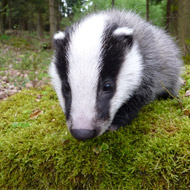
PCR testing would remove ethical concerns related to trapping
A non-invasive procedure which allows for TB infections in badger populations to be monitored without trapping has been validated in a study led by the University of Warwick.
New research, published in the Journal of Clinical Microbiology, shows that PCR testing of badger latrines is as effective, if not more, than current methods of detecting the disease in badger populations.
The procedure allows scientists to gather data on the distribution of the disease over a larger area, which is easier and more cost-effective than trapping. The non-invasive method also removes the ethical concerns related to trapping.
Monitoring Mycobacterium bovis, the bacteria which causes bovine tuberculosis, is important for understanding the location and spread of TB and directing control efforts.
Once infected, badgers intermittently shed M.Bovis cells in sputum, feces and urine, creating a source of potential infection for other badgers and cattle. The bacteria can last outside its host for up to 21 months and has been found in badger setts and latrines.
However, monitoring M.bovis in live badgers is tricky. The current method involves a combination of trapping and diagnosis with immunoassays and cultures of clinical samples. This is not only expensive, but also logistically challenging and likely to result in limited sample sizes.
In the study, the researchers focussed on quantifying fecal shedding of M.bovis cells among badgers using an existing quantitive PCR test. They collected 12 fecal samples from latrines associated with 12 badger social groups in a park in Glouscestershire.
To determine the performance of the PCR test, the scientists compared results to those from immunoassays and culture for clinical samples obtained during routine trapping and sampling of the same badgers.
They found that PCR testing is likely to be as sensitive, or more so, than live testing in M.bovis in badger populations. This indicates that PCR testing could be used as an alternative or compliment immunoassays and clinical samples.
The study also found that PCR testing had greater odds of finding positive samples. However, some badger social groups required more than 20 samples to be collected over a year to detect fecal shedding.
The researchers say that in order to identify all positive social groups, two separate sampling sessions would be required - one in early summer and the other in late summer. This is due to the intermittent nature of M.bovis shedding and the fact that a wider window of sampling is required to obtain fecal samples from a large proportion of badgers in each social group.



 The Greyhound Board of Great Britain has published new vaccination guidance, with all greyhounds registered from 1 January, 2027 required to have the L4 leptospirosis vaccination, rather than L2.
The Greyhound Board of Great Britain has published new vaccination guidance, with all greyhounds registered from 1 January, 2027 required to have the L4 leptospirosis vaccination, rather than L2.